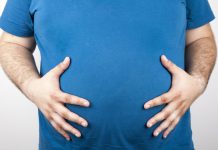Like most New Yorkers, Rob Taub, 64, has been sheltering in place as the COVID-19 pandemic swept through the city and the nation at large.
For Taub, a writer and broadcaster who lives in the city’s Upper East Side neighborhood, there has been one surprising result of the radical day-to-day life changes brought about by the outbreak — his overall health has improved.
Taub has been living with type 2 diabetes and high blood pressure for nearly 15 years. An athlete growing up, he said when he was in his 40s he “looked like an NFL player,” but then something changed as he got older.
“I started gaining 15 pounds a year. Soon I was 40 pounds, then 50 pounds overweight,” said Taub, who serves as an ambassador for the American Heart Association and the American Diabetes Association.
Now, as he’s been adhering to physical distancing and stay-at-home guidelines, he’s found that his overall health has improved.
The man who ate out at restaurants for about 80 percent of his meals now cooks for himself at home. A big change has been salt intake.
“One of the things I switched to recently prior to COVID-19 was oatmeal because there’s no salt in it and I realized my blood pressure was going down while eating it,” he said. “When cooking for myself, there is no salt. I realize restaurant food is laden with salt and it’s not good for you.”
Taub takes his blood pressure every day — at the time of his interview with Healthline it was at 112/80 mm Hg — and has been able to cut back on his medications.
These readings are better than he ever thought he’d see, especially when they were at their worst about a decade and a half ago.
Being vigilant is also important because he has a family history of these health concerns. His mother died at 73 from complications tied to diabetes.
A time to embrace healthy habits
While now is a difficult time for many — stress and anxiety are up, people’s insecurities and fears over their personal health have increased — for some people like Taub, this new way of life has ironically led to better, healthier behaviors.
Dr. Robert Eckel, the American Diabetes Association president of medicine and science, and an endocrinologist at the University of Colorado School of Medicine, said Taub’s story isn’t unusual.
With life on pause, he said that “now is a good time to focus” on health.
He added that depending on a person’s individual lifestyle and desires — and assuming they’re not facing too severe of an economic impact from the current health crisis — sheltering at home gives an opportunity to adopt some healthier behaviors, from more routine fitness to better sleep habits.
A big piece of it is reflected in Taub’s experience — eating better food.
“In general, a heart healthy diet is a diabetes healthy diet and cancer healthy and blood pressure healthy diet,” Eckel, a past-president of the American Heart Association, told Healthline.
The Center for Science in the Public Interest, an independent science-based consumer advocacy organization, writes that rampant unhealthy diets have something of a domino effect on overall health in the United States.
The organization says that diets that rely on heavily processed meals low on nutritious value contribute to about 678,000 deaths each year as a result of diseases tied to poor nutrition and obesity, like heart disease and type 2 diabetes.
It should be no surprise then that each of these conditions are highly prevalent in the United States.
Annually, heart disease is the leading cause of death nationwideTrusted Source, resulting in 1 in every 4 deaths, while more than 100 million adultsTrusted Source live with diabetes or prediabetes.
Obesity statistics are similarly high, with the condition’s prevalenceTrusted Source shooting from 30.5 percent in the year from 1999 to 2000, to 42.4 percent in the 2017–2018 time frame. The prevalence of obesity-related diseases moved from 4.7 percent to 9.2 percent during that time frame.
Eckel said that as the coronavirus puts a pause on day-to-day life, it gives Americans an opportunity to hit the reset button on some of these worrying trends.
He cited both the DASH and Mediterranean diets as fairly accessible healthy eating plans that promote weight reduction, decreased salt intake, increased daily nutritional intake, and lowered blood pressure.
He also cited moderate exercise as a way to maintain healthy behaviors while stuck at home.
This means trying to fit in about 40 to 45 minutes of moderate-intensity exercise each day — this doesn’t mean having fancy or expensive equipment. It could be a brisk walk or using light weights to include some sort of resistance-training workout at home.
Really anything to avoid being in a “predominantly sedentary position,” he explained.
The challenges of making these changes
Of course, all of this can be easier said than done for some people.
The emotional, psychological, and financial toll taken by COVID-19 can make it hard for people to dedicate time to make some of these lifestyle shifts.
Dr. Luke Laffin, a cardiologist at Cleveland Clinic, told Healthline that the people he treats generally have fallen in two camps during this crisis. One group was already exercising, visiting gyms, and adhering to healthy diets. Anecdotally, he noticed this group actually seemed to “fall off a bit” from their schedules once sheltering at home.
“They haven’t been doing as well in this setting,” Laffin said.
The other group consists of people who weren’t regularly exercising, not making the best dietary choices, but are now changing their routines slightly, finding they have more time to go for a walk or start preparing meals.
“It’s a double-edged sword. I’ve seen people benefit from this time but also some people not benefit as much,” he added.
For those in the second group, does Laffin envision these new healthy habits being maintained over the years once the COVID-19 threat passes?
“I think the most important part is getting into these habits and routines, and sticking with them. People are creatures of habit, so if for a couple of months with more time to exercise and eat healthily, I hope they find they can’t go without the daily routine of eating healthier, of making these choices,” he said.
If they feel better and see that their weight is lower and that their overall health has improved, Laffin added that he hopes these people will see these are necessary behaviors to hold on to.




























